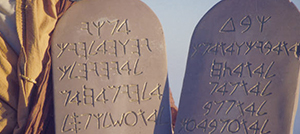“Unto the pure all things are pure; but unto them that are defiled and unfaithful is nothing pure; but both their mind and conscience are defiled. They profess to have known God, but by their works they renounce Him, being abominable and disobedient, and to every good work worthless.” “Keep thy heart with all diligence; for out of it are the issues of life.”–Titus 1:15, 16; Proverbs 4:23.
OUR first text is an extremely severe arraignment. The context seems to imply that the Apostle Paul was addressing some who were identified in a sense with the Cause of God, but whose doctrines and manner of life were in conflict with the Message of the Gospel. Whether he referred to unbelieving Jews or to those who had at least outwardly become followers of Christ we may not be sure. He was referring, at any rate, to those who professed to have known God, whether they knew Him through the Law or through the Gospel. The language seems to imply that these were fault-finders. They could find fault with everything—nobody could do anything just right, no doctrines were right. We have all met people of this character—people who see nothing pure, nothing good, anywhere, and who are denouncing others all the time.
The Apostle’s statement is very strong, very forceful—”Unto the pure all things are pure; but unto them that are defiled and unfaithful is nothing pure.” We understand him to mean by these words, not literally that the pure could find nothing that is impure, nor that the impure could find nothing pure, but that this is true in a broad, general way. Those who are themselves pure can see righteousness in the Divine Law and in the Divine arrangement. They can see the true, pure hearts of God’s sincere “little ones,” in spite of the weaknesses of their fallen flesh. But the unfaithful become defiled, their consciences become perverted, so that they are unable to see anything or anybody in a proper light. They have permitted ill-natured thoughts to enter the mind and lodge there—suspicions, evil surmisings, such as, “Every man has his price. Every man can be bought. There is not one that is honest”; and all that sort of thing. They have been more or less judging others by themselves.
Not only the minds of such become corrupted, seeing nothing pure, nothing good, nothing right, in others; but their consciences become defiled. At first the conscience of such would to some extent reprove them. But gradually, if they yield to this wrong heart attitude, their consciences become corrupt and hardened, so that they do not realize that they are prevaricating, misjudging, do not see how unjust, impure and blind they have become. “They profess to have known God,” says the Apostle—knowing something in an intellectual way about His Plan and Word—”but by their works they deny Him.” Their works are contrary to God’s Word, which instructs that all should seek to do all the good they can, to see all the good they can, and to give generous judgment to others.
FAULT-FINDERS, ACCUSERS OF THE BRETHREN
These defiled ones deny God, renounce Him in their works—as St. Paul declares, they are “abominable, and disobedient” to God, walking contrary to His instructions. This is surely an abominable thing to do—after knowing the Lord to go in an opposite direction, and set His counsel at naught. Such are “to every good work worthless.” They do not accomplish anything good, but the very opposite; yet they find fault with everybody else.
The Apostle is not saying here that such have necessarily become immoral and vile in that they have become delvers into all kinds of sin and vice. We are not to read into his words anything that is not there. But he does say that so far as any good work is concerned they will defile it, injure it. Better would it be that they keep away from the Lord’s work entirely. They have allowed the bitter spirit to work in them until everything takes on the color of their own minds. They do not recognize to what an extent they are unjust, unrighteous, in their thoughts, their words, their conduct. They are injurious to every good work.
There are lessons of warning here for all of us, lest we should be led astray by the spirit of the Wicked One and become mere fault-finders, accusers of the brethren—not giving our time, our hands, our feet, our tongues, to doing good, to blessing and upbuilding the brethren, but rather to tearing down. In proportion as any one does this, he is worthless, yea, worse than worthless, to the Lord and to His Cause.
NECESSITY FOR GUARDING THE HEART
“Keep thy heart with all diligence, for out of it are the issues of life,” exhorts the Wise Man. The thought embodied in this exhortation is of the utmost importance. Truly these are words of wisdom! As the heart is perhaps the most important organ of the human body, so the word “heart” is here used in a figurative way to represent the center of the affections of the human mind. The implication is that the heart needs keeping. There are many things to distract, to draw away, to lead astray. Not only the burden of business, but also the trend of the world in general and of our fallen flesh, tend to lead the heart away from righteousness, from the service of God, from purity, love and kindliness toward others.
The great Adversary also gives his assistance in attempts to thus mislead. The heart—the will, the affections—of every human being should be loyal to God and to righteousness. It was made so originally. As the magnetic needle turns to the pole, so the human heart should turn to the Lord. Anything to the contrary represents a sinful, distorted, perverted condition. But as a matter of fact, sin has become firmly implanted in the fallen human nature. During these long centuries of sin many people have striven to keep their hearts right with God. But after getting right, the majority fail to abide in that condition, to keep their heart in God’s love, to keep it from going into wrong avenues, from getting into the wrong condition.
We often have difficulty in managing our bodies. There are appetites of the flesh that need constant watching. The tongue needs continual guarding. While we are to watch all these things carefully, yet the most important thing to watch is the heart; for all our evil tendencies have their mainspring there. “A good man out of the good treasure of his heart bringeth forth good things; and an evil man out of the evil treasure of his heart bringeth forth evil things.” We should be ever alert to see that our heart is kept pure, true. If we find impurities there, they should be prayerfully fought against and made right. We should keep our minds filled with that which is pure, worthy, Godlike.
As children of God we have learned that the only way to have our hearts right with our Father is through the Lord Jesus Christ. We have come to God through Christ and thus become His sons, receiving His Holy Spirit. Then we have a new influence, a new fountain, opened in the heart, which changes its current, which sweetens its outflow. Thenceforth we love righteousness and hate iniquity. If there is any variation from this at any time, we should see that we are promptly brought back into alignment with the Spirit of the Lord. We need to keep our heart continually under inspection, so that we may abide in close fellowship with the Father and with our Lord Jesus.
“For out of it [the heart] are the issues of life,” declared Solomon. From this organ—the heart—the blood is pumped out to all parts of the body. The body is thus dependent upon the heart for its strength, its vitality, its very life. The body would be dead if the heart did not continually propel the blood through the system. So the issues of our bodily life are going forth from the heart every day, yea, every moment. It is either issuing little life or much life each day. So it is with the seat of our affections—so it is with our will. All who come in contact with us day by day are influenced for good or for evil by the spirit we manifest. It is highly important that all our conduct in life should be under the proper direction of a pure heart—one that is carefully watched and kept under inspection, so that today as we go forth, a good issue shall flow out from our heart to others. Thus the Lord will be pleased with us, and will count us “dear children.” Thus shall our minds and consciences be kept undefiled.
THE FINAL ISSUE—LIFE OR DEATH
But there is a further sense, a vital sense, in which the issues of life are from the heart. God has informed us that though He sentenced our race to death, He has made provision for a future and an eternal life for all. And the conditions on which any may have this eternal life are set forth in the Scriptures. They tell us of certain things that must be done. To us who are called and accepted now it is important that we do all we are able to do, because by nature we have sin entrenched in our flesh. Like all of Adam’s race, we are imperfect by nature through his fall; but the Lord informs us that if we become His children He will judge us by the heart—by our will, our intention, our desire, our efforts. Therefore when we are thinking of the glorious prize, we are to remember that the ultimate issue of this matter, the final decision, will depend altogether upon how we have fulfilled the conditions. It is as in a court, where a jury is sworn in to decide what the verdict shall be—whether in favor of one party or the other party. There will be an issue in our case, a decision, from which there will be no appeal.
The world will be on trial in the next Age, but the Church of Christ is on trial now—from the time they are begotten of the Holy Spirit. The new life is on trial. Our new heart is before the bar of Divine judgment. That new heart, then, needs keeping very carefully, since connected with it are the issues of eternal life or eternal death. Our hopes are not dependent on a perfect body; some may have a sick body, some may have a naturally amiable disposition, and others not. But our old bodies are reckoned dead from the moment we become New Creatures, and the New Creature is responsible for the control of the body to the best of its ability. These new hearts are to be kept loyal to God, to the principles of righteousness, truth, equity—loyal to our Covenant. If we fail properly to cultivate Christlike character, if we fail to keep in attunement with the Lord, then we shall never develop as New Creatures in Christ. And when the decisive testings come, we shall be found wanting.
The Lord has promised to give the blessing of glory, honor, immortality, joint-heirship with Jesus, to those who during the Gospel Age attain His character-likeness. And that character-likeness to God will demonstrate our loyalty to the principles of righteousness and to the Divine will. In the case of our Lord Jesus, He was willing, glad, to sacrifice everything to do the Father’s will. So must it be with all who would be counted in with Christ. The issues, the results, of our life are here. God says to us, as followers of Christ, as His professed disciples, “I have set before you life and death, blessing and cursing. Choose life that ye may live.” Life is the blessing; death is the curse. All through the Bible this thought is maintained—that the gift of God is His blessing of eternal life, and that “the wages of sin” is the curse of death—not torment.
So to the Christian the issue of our life here on earth is life eternal, if we are faithful. Failing to gain the life eternal, we shall go into death—the Second Death; for if we are disloyal to the principles of righteousness and to the opportunities granted us in this trial for everlasting life that has come to us in the Gospel Age, there remains no future opportunity for us. These words apply to those who have really become children of God, who have tasted of the “heavenly gift.” How important, then, to keep our hearts true, loyal, undefiled!
FINAL ISSUE OF LIFE DIFFERING IN DEGREE
Amongst those in whose cases the issue will be everlasting life, there will be different ranks, as regards the degree of honor and blessing. As the Apostle pictures it, “For star differeth from star in glory; so also is the resurrection of the dead”—so it will be with those who have a part in the First Resurrection. Some will have a brighter glory in the Kingdom than others. We might say that there will be various issues—greater honor and less honor. As elsewhere shown in the Scriptures, there are two classes who will gain everlasting life on the spiritual plane of being. Many will be of the Great Company; some will be of the Little Flock, the Bride of Christ. Some will attain the highest plane, immortality; but more will get life similar to that of the angels, on a lower spirit plane.
So we see the wisdom of the Scriptural exhortation that the heart needs constant attention, because there are such important, vital issues in respect to it. And we see the wisdom in warning of the danger of permitting the mind and the conscience to become defiled and impure. Some might say, “I will be very careful about every word I speak.” Very well so far. But to keep the tongue would not alone be sufficient to give eternal life; for the heart might be quite different from the tongue in some cases. One might be able to speak very smoothly, yet have a deceitful, impure heart. Again, one might say, “I will watch my body, and not sin with it.” But that would not be enough. We must get down to the source. The Lord is looking at the desires, the intentions of the heart, in His people. This needs special watching, because the heart is the battle-ground, so great are the issues from it–life or death. If life, then we desire that we may have the highest place that God is willing to grant us. And it is ours by meeting the conditions.











